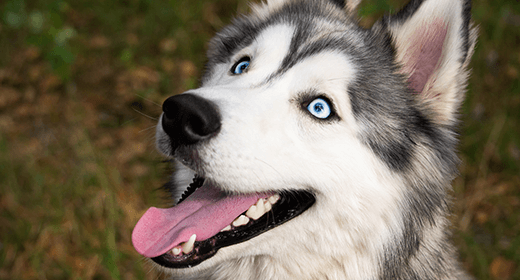

Chicken, a complete protein source, is a key ingredient in IAMS™ dog foods, including IAMS™ ProActive Health™ Adult MiniChunks. As an animal-based protein, chicken can help maintain your dog’s muscle structure and naturally provides all the amino acids essential to carnivorous animals such as dogs. Plus, chicken adds great flavor.
Learn more about chicken’s role in your dog’s complete, well-balanced diet.
Common chicken ingredients in dog food include chicken, chicken meal, chicken byproduct meal and chicken fat:
Another common chicken-based ingredient is natural chicken flavor, also called chicken digest. Natural chicken flavor adds palatability and nutrients. It is high-quality protein and fat material that has been reduced to amino and fatty acids to improve flavor through an enzymatic process.
Internal organs are rich sources of protein, fats and minerals, such as iron, that are essential to dog health and add to the palatability of the pet food. Including some ground bone provides a good source of minerals, such as calcium. Some pet-food manufacturers formulate their products without such ingredients to appeal to dog owners, rather than to help dogs achieve optimal health. However, the nutritional needs of dogs are not the same as the nutritional needs of humans.
Dried chicken-protein sources in our chicken-based dog foods undergo an extra refining process. Refined chicken meal and chicken byproduct meal are excellent and complete sources of protein because they naturally contain each of the amino acids that are essential to dogs.




Teeth are important players in the digestive process.
As teeth grind up food, debris accumulates on the tooth surface and attracts bacteria. This accumulation of debris and bacteria is called plaque. Plaque is easily removed from teeth by brushing—that is, when teeth are brushed frequently.
If the plaque isn't brushed away, mineral deposits cause it to harden on the teeth. This is called tartar. Dark yellow or brown accumulations on the teeth are indicators of tartar, which is difficult to remove.
If left untreated, plaque can lead to damage of the gums (gingivitis) or the jawbones and teeth (periodontitis).
Keeping a pet’s teeth and gums healthy involves regular brushing and professional cleaning. Unfortunately, many owners have problems brushing their dogs’ teeth on a regular basis.
Special diets also can help reduce tartar buildup between cleanings. Most dental diets are formulated with a tough kibble that is texturized to scrape off some plaque.
Our dental technology uses a patent-pending manufacturing process that enables dry-food kibbles to control tartar buildup. This process does not affect the nutrient content of the food or the size of the kibbles.
IAMS™ researchers have looked at the effects of feeding dogs dry diets with our dental technology. In each of these studies, two groups of animals were fed our formula, either with (control) or without our dental technology.
All animals had their teeth thoroughly cleaned.
After 28 days of eating one diet, animals’ teeth were examined for tartar.
All animals then received another thorough cleaning.
Then diets were switched for another feeding period.
In dogs, the diets featuring our dental technology reduced tartar accumulation as much as 50% compared to dogs fed the control diet.'